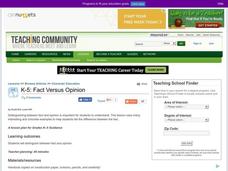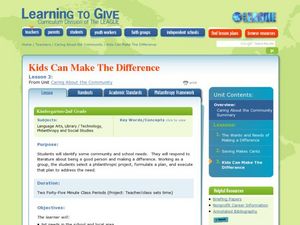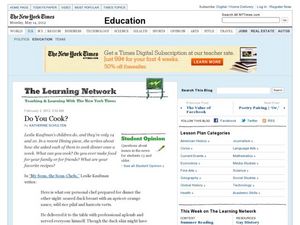Curated OER
Do You Prefer Your Children's Book Characters Obedient or Contrary? Opinion Writing
With this New York Times "Learning Network" exercise, high schoolers read an article about the death of Maurice Sendak, author of Where the Wild Things Are and then respond to several prompts that require them to shape their own opinions...
Curated OER
It's Your Opinion
Everyone has a different opinion about the characters they read about in books. Have your class explore forming an opinion and finding evidence to support it as they read and discuss what they think about a particular character. They...
Curated OER
Eastside Literacy Reading Lesson - Fact or Opinion
Analyze critical thinking skills that involve the ability to distinguish between fact and opinion through self-reflection. Higher education students will collect a newspaper article, advertisement, magazine article, tabloid article,...
Newseum
Editorials and Opinion Articles
Reading the news is fun, and that's a fact! With the lesson plan, scholars differentiate between fact and opinion as they read editorial articles. They complete a worksheet to analyze the information before writing their own editorials...
Curated OER
Student Opinion: When Did You Have a Great Conversation?
Conduct a classroom conversation about communication using this resource as a jumping-off point. For this The Learning Network activity, learners read an excerpt from The New York Times opinion piece, "The Flight From Conversation," and...
Curated OER
Student Opinion: Who Inspires You?
Inspire your class to write about role models and personal heroes with this resource from The Learning Network. Class members read a New York Times article excerpt about basketball star Jeremy Lin and how he inspired the author. After...
Curated OER
Fact and Opinion: How to Tell the Difference
Students explore reasoning by completing a worksheet activity in class. In this fact vs. opinion lesson, students identify the differences between a personal opinion and something that is factually true. Students identify several...
Curated OER
Fact Versus Opinion
Students differentiate between fact and opinion. They define fact and opinion, then listen to and identify examples of each. Students identify different books where facts and opinions can be found, and cut out newspaper and magazine...
Curated OER
Political Issues and Opinions
The emergent adults in your US Government class can become informed, self-aware voters. This activity enables them to form an opinion about particular political issues then identify themselves on the political spectrum. Informed and...
E Reading Worksheets
Fact and Opinion - Worksheet: 2
After reading a statement, learners decide if it is a fact or opinion. Then, they write a sentence explaining how they know their answer is correct. The sheet contains 25 fact and opinion sentences.
Media Smarts
Hoax? Scholarly Research? Personal Opinion?
Divide your class into groups to study the validity of online sources. One group looks at the authority and accuracy of four listed websites, another group looks at advocacy and objectivity, and the third group looks at currency and...
Curated OER
The Formation of Public Opinion: Ch 8
After reading about the formation of public opinion, the class can complete this quiz. They answer 5 true/false statements regarding public policy, political attitudes, and public opinion. Then they answer 5 multiple-choice questions...
Curated OER
Build Mastery: Fact and Opinion
Is it a fact or an opinion? Get your kids up and moving during this reading comprehension activity. They listen to you read a book or passage (consider writing something yourself to get the ideal text), listening for facts and opinions....
Curated OER
Fact Versus Opinion
Young learners distinguish statements as fact or fiction. After exploring a newspaper, they determine the type of information it contains. They read editorial articles and discuss the differences between the editorial page and the front...
Curated OER
Introduce: Fact and Opinion
Build reading comprehension and critical-thinking skills as learners focus on discerning fact from opinion. First, introduce the two terms as you test prior knowledge and explain their meanings (there is a scripted explanation here for...
Curated OER
Gender Opinions Using Adjectives
Activate personal experience and opinions with this graphic organizer. Learners response to 8 questions about gender and then record responses from classmates. This activity could be set up as a give-one/get-one and class members could...
Curated OER
Forming an Opinion with Organizational Elements - Cats, Yesterday and Today
In this age of information overload, it is often difficult for young people to know what they think about a topic. The graphic organizer, video, and activities included with this resource show middle schoolers how to use proven facts to...
Curated OER
Student Opinion: Are You Popular, Quirky or Conformist?
Approach the topic of popularity with this resource from the New York Times and their Learning Network series. The article is about Alexandra Robbins' "Quirk Theory." Learners respond to the article excerpt either on paper or online....
Curated OER
Kids Can Make a Difference
What is a philanthropist? We can all be philanthropists! After assessing the needs of the school and listening to literature about how they can help others, primary learners develop a class project and maintain a journal of their...
Curated OER
Form an Opinion Based on Facts
Explore fact and opinion through higher level thinking and literacy. Kids listen to the beginning of A Picture Book of Helen Keller by David A. Adler and identify facts in the text. They follow along as the teacher models how to form an...
EngageNY
Mid-Unit 3 Assessment, Part II: Organizing Notes for a Public Speech
It's all a matter of opinion! Pupils take Part II of the mid-unit assessment, in which they continue organizing their notes in preparation for writing an opinion speech. Using the resource, they add reasons, evidence, and a concluding...
Curated OER
Student Opinion: What Teacher Do You Appreciate?
This online resource is composed of a writing sample about teacher appreciation and a writing prompt for learners. You could use this as an in-class journal activity or you could have class members post their responses on the New York...
Curated OER
Children Cooking at Home: Developing Opinions
Excerpts from a New York Times article about children cooking dinner for their family can lead learners to express opinions about taking on real life responsibilities. The story will prompt discussion, but add more questions directed at...
Curated OER
Template #1 A Lesson Before Dying Journal Reflections/Personal Statements
If you're working through A Lesson Before Dying, by Ernest J. Gaines, you might be interested in this resource. Pupils fill this page out after reading each chapter in order to create a short summary and clarify plot points and...

























